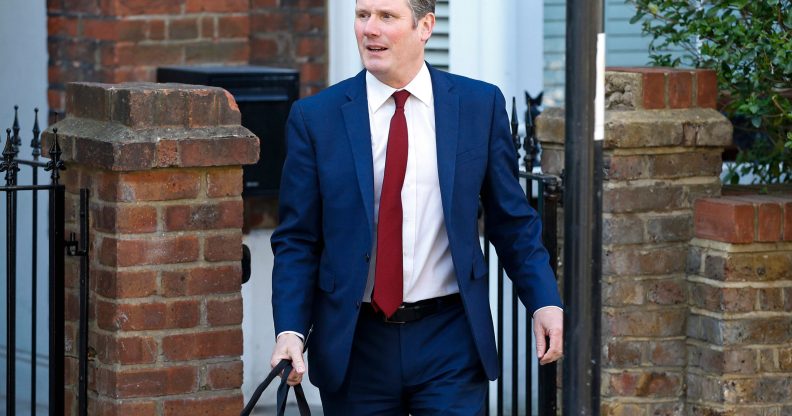Keir Starmer vows Labour will scrutinise plans for Gender Recognition Act reform – when they are published by government

Sir Keir Starmer leaves his home on April 4, 2020 in London, England. (Hollie Adams/Getty Images)
Keir Starmer says Labour will scrutinise the government’s proposals for reforming the Gender Recognition Act — when they are published.
The Sunday Times reported June 14 that Boris Johnson and his equalities chief Liz Truss allegedly plan to scrap long-delayed GRA reforms and instead bring in “new protections” for women’s spaces that would bar trans women from using them.
Calls have been growing for Labour to respond to the news that GRA reform has been dropped, and Starmer confirmed yesterday that Labour would scrutinise the plans – when they are published.
“We haven’t actually seen any details of these proposals,” Starmer’s spokesperson told Labour List. “The government hasn’t put any proposals forward. Once they do, we’ll look at them and take a view.”
Keir Starmer says trans rights are human rights.
The spokesperson added: “Keir Starmer said repeatedly during the Labour leadership campaign that trans rights are human rights.
“Labour is absolutely committed to trans people and supports updating the Gender Recognition Act and upholding the Equality Act.
“We need to see the details of whatever the government intends to bring forward or not, but Keir is absolutely clear that trans rights are human rights, and we stand by that commitment.”
Asked which part of the GRA Starmer would like to see updated, his spokesperson said: “Keir has been clear on this issue… Labour has a proud history of advancing LGBT rights.”
He continued: “We want to work with all sides of the debate… This is a nuanced debate, which has to be considered carefully.”
The spokesperson added that Labour’s 2019 manifesto included a commitment to reforming the GRA and that Starmer “stood on that manifesto”.
Majority of GRA consultation respondents reportedly backed reform.
Transgender people in the UK use the GRA to gain legal gender recognition, but the process is out of date, overly medicalised and expensive.
In 2017, then prime minister Theresa May vowed to reform the legislation so that more trans people could use it to update the gender marker on their birth certificates – as government research had found that despite there being up to half a million trans people in the UK, less than 5,000 have used the GRA to gain legal gender recognition.
Potential reforms included extending legal gender recognition to non-binary people, lowering the minimum age for legal gender recognition from 18 to 16, and removing the need for trans people to have a medical diagnosis of gender dysphoria before being able to change their legal gender.
Announcing a public consultation on the proposed reforms, May emphasised that “being trans is not an illness”.
The Sunday Times reported that of the more than 100,000 people who responded to that consultation, around 70 per cent backed proposals to demedicalise the process and allow trans people to self-determine their legal gender.
However, the paper also reported that Johnson and Truss believe these results were “skewed” because trans people themselves responded to the consultation about their rights.

